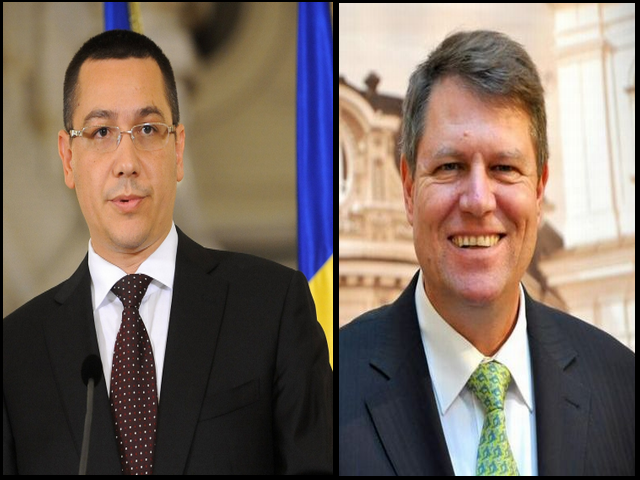Preparations ahead of the second round of the presidential elections
On Sunday, Romanian voters will elect a new president for the next five years

Bogdan Matei, 13.11.2014, 14:17
The winner of the first round of the presidential elections with 40% of the votes, the Social Democrat Victor Ponta is, at 42, the youngest prime minister in post-communist Romania. He is running for president on behalf of an alliance comprising the Social Democratic Party, the National Union for the Progress of Romania and the Conservative Party. A law school graduate, he became a politician after a short career as a prosecutor. In the early 2000s, he worked closely with the former prime minister, the controversial politician Adrian Nastase, before becoming the leader of the Social Democratic Party in 2012.
In the last two and a half years he has spent as Prime Minister, Ponta has become popular with traditional left-wing voters in the east and south-east of the country, whose votes ensured his first round victory. His popularity is mainly based on Romania’s positive macroeconomic performance, generous social protection measures, the ability to tell voters what they like to hear and a passion for sports.
However, his opponents have criticised him for a lack of competence in the economic area, suspicious relationships with party members who are now in prison for corruption and for his inability to adjust his manner and speech to fit the circumstances, being accused of being too cheerful in all the wrong situations.
In stark contrast to Ponta, Klaus Iohannis is one of the most sober politicians on the Romanian scene. A candidate of the Christian Liberal Alliance made up of the National Liberal Party and the Liberal Democratic Party, he won 30% of the votes in the first round. However, his sober manner, while earning him the respect of some people, also generates boredom in other people. At 55, Iohannis is one of the longest-serving mayors in Romania. First elected a mayor of the central city of Sibiu in 2000, he went on to win comfortably three more terms. A rare case among Romanian politicians in the local administration, he has not been the subject of any corruption investigation in his 14-year-long career.
Everybody appears to agree that Sibiu is one of the best managed cities in the country, being even awarded the title of European capital of culture in 2007. His supporters say this is largely his merit. A former physics teacher, Iohannis is a German ethnic and a member of the Lutheran community. Unlike hundreds of thousands of ethnic Germans from Romania who have moved to Germany in recent decades, Iohannis has preferred to stay in Romania. His rivals say he is not a good speaker, that he is too provincial for a top leadership position in Bucharest and that he does not relate to the values of the ethnic Romanian and Orthodox majority.
In the second round of the presidential vote, Victor Ponta relies on the support of some of the candidates who lost in the first round, such as the former Liberal prime minister Calin Popescu Tariceanu, the populist politicians Corneliu Vadim Tudor and Dan Diaconescu and the former head of the Foreign Intelligence Service, Teodor Melescanu, who was just appointed foreign minister. Iohannis is supported by the MEP Monica Macovei, herself a candidate in the first round, when she ran as an independent. Elena Udrea, the head of the People’s Movement Party did not support Iohannis explicitly, but advised people to vote against Ponta. In the meantime, everybody is looking forward to Sunday evening, when the winner of the presidential race will be known.






























